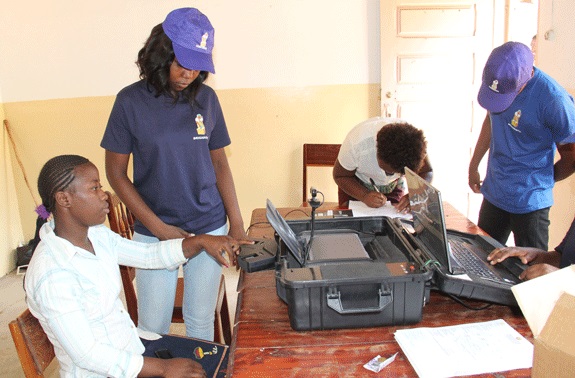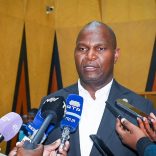Mozambique: President Chapo highlights Bonifácio Gruveta's legacy as an example of patriotism for ...
Mozambique elections: Registration delayed to March-April 2018 – Hanlon

File photo
Detailed coverage of 2018 municipal and 2019 national elections will again be provided by the Mozambique Political Process Bulletin, which has covered all of Mozambique’s multi-party elections. Again, we will have a large team of local journalists throughout the country, ensuring that our reports are accurate and verified. Publication is monthly during preparation periods but will become more frequent and we will publish daily in election periods.
Registration in March-April for 10 October 2018 local elections
Electoral registration will take place 1 March to 29 April 2018 in all districts that have elected municipal governments, the Council of Ministers decided on 18 July. It rejected proposals by the electoral authorities to only update the 2015 electoral roll, and instead there will be an entirely new registration. The National Elections Commission (CNE, Comissao Nacional de Eleicoes) expects to register 8 million voters, half within the 53 municipalities and half in the surrounding districts.
Municipal elections will take place on 10 October 2018, the Council of Ministers announced on 6 April. No precise date has been set yet for national elections due in October 2019.
Mozambican electoral law has been regularly amended since 1994, but never completely rewritten, so there are inconsistencies and imprecisions. In particular, it was unclear when, where, and how the registration should take place.
Registration will be late
The registration law says that 1) “Electoral registration is valid for each electoral cycle”, 2) “electoral registration is updated in the years of elections” and 3) that the registration update must take place in the six months after the date of the election is announced, which in turn is 18 months before the election. This means three updates – 2019, 2018, and 2017.
The election date was set on 6 April so the registration should be taking place by 6 October of this year. But with the National Population and Housing Census taking place in the first two weeks of August, this seemed impractical, both in financial terms, but also because it would be confusing to the public – national census takers go house to house, but for electoral registration voters must go to a registration post (in the same place where they will vote).
There has been no revision of the registration law, and within the National Elections Commission (CNE, Comissao Nacional de Eleicoes) Renamo argued that the law demanded an entirely new national electoral registration this year, followed by updates. With no consensus inside the CNE, Renamo called for a request to parliament (Assembleia da Republica, AR) for an official interpretation of the law. This was resisted by other members, who said the CNE did not have the legal standing to make such a request, and in any case the AR was not in session. Daviz Simango, head of the second opposition party, the MDM (Mozambique Democratic Movement), proposed an updating in 2018 just for municipal elections, and then an entirely new national electoral registration in 2019.
Despite Renamo’s views, there was broad political agreement that an electoral registration this year was not practical. The CNE simply never called the 2017 registration required by law. Finally the CNE reached a consensus to submit to the Council of Ministers a proposal for a registration update, but only in the districts with municipalities, next March and April. But it also agreed to seek a legal opinion from the AR.
New or updated register?
One of the imprecisions in the registration law is that “registration is valid for each electoral cycle” – that is, municipal and national elections, which take place one year apart – but the law always talks about “updating” (“actualizar” in Portuguese) the electoral register. Updating means old voting cards and register books remain valid, and people only need to re-register if they have moved or lost their voters card.
In the past, there has been an entirely new registration for each electoral cycle, which is quite expensive. The CNE, and in particular its administrative arm, the Technical Secretariat for Electoral Administration (STAE, Secretariado Tecnico da Administracao Eleitoral), said that by now a successful registration system has been established, and it would make sense to use the existing computer based register and simply update. The law talks of updates, so the CNE proposed an update.
But the Council of Ministers interpreted the law to say that the 2014 register was not valid after that election, and an entirely new registration must be done for this pair of elections.
Not just municipalities
The other issue for the CNE was that boundaries of municipalities are not clear to residents and in some cities there are suburbs outside the city, while in others such as Vilankulo and Manhica there are rural areas inside the city. CNE and STAE were worried that if an entirely new registration was done only in the municipalities, many people living outside the official boundaries would come into the city to register. So they proposed that the registration should be done in the entire district containing the municipality, encouraging people to register at the school nearest their home.
At first, it appeared that the Council of Ministers also rejected this. After the 18 July Council of Ministers meeting, spokesperson Ana Comoana said that the registration would only be in the municipalities themselves, but that they expected 8 million people to be registered. (Noticias 19 July) But it was noted that in the CNE proposal it was estimated that of the 8 million, only half were in the municipalities and the other half were in surrounding districts.
Thus it appears the spokesperson made a mistake.
The CNE confirmed on 10 August that registration will be in the entire districts with municipalities. But nearly a month after the Council of Minister meeting, the document has still not been published or made available to the press. This suggests that the decree is still subject to discussion, even though it has been approved.
When does the CNE term end?
The National Elections Commission, or at least some of its members, could come to the end of their term in May 2019, in the middle of the 2019 national elections – and no one seems quite sure what will happen. The electoral law says that “the mandate of members of the CNE is six years” and that “the mandate of members of the CNE ends with the taking of office of new members”.
The CNE has 17 members, but the government-Renamo negotiations in 2014 and the changing laws meant three groups of members took office at different times:
The first group took office in May 2013
1. Abdul Carimo Sau – president of CNE (civil soc)
2. Rabia Valgy (civil society)
3. Paulo Cuinica (civil society)
4. Antonio Chipanga – first vice-president (Frelimo)
5. Rodrigues Timba (Frelimo)
6. Antonio Muacorica (Frelimo)
7. Abilio da Conceicao Diruai (Frelimo)
8. Eugenia Chimpene (Frelimo)
9. Bernabe Ncomo (MDM)
The second group took office in March 2014
10. Meque Bras – second vice-president (Renamo)
11. Latino Caetano Barros Ligonha (Renamo)
12. Celestino Taveiras da Costa Xavier (Renamo)
13. Fernando Mazanga (Renamo);
The third group took office in April 2014
14. Jeremias Timana (civil society)
15. Salomao Moyana (civil society)
16. Apolinario Joao (civil society)
17. Jose Belmiro (civil society)
Thus the six year term of the first group ends before the 2019 national elections in October, while the other two end afterward, in 2020. There is a feeling that changing all or part of the CNE, including the president, in the middle of an election process would be disruptive. Parliament could do two different things; it could pass a law extending all members until mid-2020, or it could simply not appoint members to replace the first nine who would then remain in post.
However Renamo, whose members’ terms do not expire until 2020, argues that the six year limit must be obeyed. The second opposition party, the MDM (Mozambique Democratic Movement), which has only one member, wants a complete revision of the CNE.
Limited law changes
Huge differences between the parties on their views of the electoral system have made parliament and leading politicians very reluctant to reopen discussion of the electoral law, and if possible to make no changes at all. But some changes will be required to implement any agreement reached between Renamo and the government in negotiations due to end before the end of this year.
Renamo is demanding elected governors, which will require both a constitutional amendment and a change to the election law to allow a fourth ballot paper in 2019.
Renamo spokesman Antonio Muchanga said that there were many issues on the table in the discussions, including electoral registration, so agreement might bring other changes. He also argues that the CNE was wrong to establish district election commissions only in the municipalities and that they should have been established in all districts to allow a registration. Each district election commission has two Renamo members, which would create nearly 300 salaries for Renamo.
For its part, MDM President Daviz Simango is calling for a total change to the electoral administration, with a tiny CNE of 6 or 7 members. STAE is too independent of the CNE and should be incorporated into the CNE, he said.
More municipalities?
Municipalisation, in which town and cities have elected mayors and assemblies and some degree of fiscal autonomy, was designed as a progressive process, and the number of municipalities increased from 33 in 1998 to 53 in 2013.
In 2013 ten new municipalities were created at the last minute, causing problems for CNE and STAE which rushed to set up the electoral machine. The CNE has already created 53 municipal CNEs and STAEs, and has appealed to government to act quickly if it plans more municipalities. President Nyusi said at the end of a visit to Inhambane that the current financial crisis would prevent the creation of more municipalities. But it is known that Renamo in its negotiations with government has tabled an increase in the number of municipalities as well as the election of governors, so an increase in the number remains possible.
Renamo spokesman Antonio Muchanga said “we do not agree with gradualism. We demand that the whole territory be municipalised. The justification of lack of financial capacity of the municipalities is not plausible. The state also has no financial capacity so should it relinquish its sovereignty?”
MDM head Daviz Simango also argues that their should be elected local governments throughout the country, but accepts that it is now too late to do this for the next elections, and thus he expects voting to only be in the present 53.
In Portuguese, elected local governments are known as “autarquias locais”. It is expected that the negotiations between Renamo and the government will lead to a similar structure for provinces. They already have elected assemblies but legislation will be needed to create fiscal autonomy similar to that of the municipalities, and a constitutional amendment is needed to allow election of governors.
Saving money
The CNE is under pressure to reduce costs. and it hopes to use much of the same computer and other equipment that was used for registration for 2013-4 elections. A pilot registration is proposed to test the equipment, although a dates and locations have not been identified.
And there is agreement to share resources with the National Statistics Institute (Instituto Nacional de Estatisticas, INE) which is carrying out the 1-15 August national population and housing census. INE is using STAE offices and staff, and will give the CNE rapid access to data to help them plan the electoral registration.
CNE and STAE had wanted to introduce a more durable voters card, similar to the identity card (Bilhete de Identidade) or a credit card, instead of the present paper sheet laminated in plastic. Such a card could also contain biometric data not captured as part of the registration process. But this would require new portable units to produce the cards, and finance does not seem to be available.
Two elections
The electoral cycle has two elections, municipal elections in October 2018 and national elections in October 2019.
There are currently 53 municipalities, with 3 million voters registered in 2013; there were 11 mn registered voters for 2014 national elections.
In municipal elections, there are two ballot papers, one for mayor (presidente) and one for a party list for the municipal assembly. Citizens lists as well as parties can stand for assemblies and independent candidates can stand for mayor.
In the 2014 national elections there were three ballot papers – one for president, one for a party for the national parliament (each province is a constituency), and one for a party for the provincial assembly (where each district is a constituency). Current negotiations with Renamo appear to have agreed that there should be elected provincial governors, so in 2019 there may be a fourth ballot paper. In national elections, citizens abroad also have the right to vote. Only registered parties can stand for national parliament but citizens lists can stand for provincial assemblies. Candidates for national president are presented by parties or can be independents, but all require the signatures of 10,000 registered voters.
In elections for mayor and president, the victorious candidate must receive more than half the votes. If no candidate does so, then there is a second round between the two candidates with the most votes. Some second rounds are likely in 2018 municipal elections.
Voting takes place on one day. Each polling station has a register book of up to 800 voters. Each polling station operates independently and does its own count at the end of voting. Results are sent to the district elections commission, but official copies are also posted on the polling station door and given to party agents and observers, which makes it possible to do a parallel count.
Calendar
The official calendar was approved by the CNE on 21 April, and is in the attached pdf (in Portuguese). Key dates, all 2018, are:
26-30 Jan: party delegates (fiscais) accredited for registration
by 31 Jan: announce registration locations
1 Mar – 29 Apr: registration in municipalities and surrounding districts
1-4 May: register books displayed
30 Apr – 18 June: appeals and protests
30 Apr – 9 Sep: corrections to register
1-15 June: registration of parties and citizens lists
18 June – 18 July: publication of registration details. This shows the number of members in municipal assemblies (determined by number registered) and the number and location of polling stations (one for each register book).
21 June – 27 July: presentation of candidates
1-22 Aug: selection of polling station staff
17 Aug – 10 Sep: publication of polling station list
21-25 Aug: parties name their polling station staff members
17 Aug – 20 Sep: parties submit names of party delegates for polling stations; credentials to be issued by 7 Oct.
25 Sep – 7 Oct: official election campaign. Campaigning can begin at any time, but the period of the official campaign gives parties and candidates extra rights, for example access to facilities and time off work.
25 Sep – 30 Oct: ban on publication of opinion polls
10 Oct – voting day; counting immediately after in polling station
10-12 Oct: protests must be made to district courts
11-12 Oct: announce results in municipality
18-23 Oct: recheck all invalid votes by CNE
14-24 Oct: CNE announces official results (making any changes, including votes accepted as valid)
no fixed date: Constitutional Council (CC) corrects and validates results.
Within 30 days of CC validation: any second rounds required to elect mayors, date set by Council of Ministers subject to CNE proposal; 10 day election campaign.
Journalists and independent observers can be accredited at any time.
By Joseph Hanlon












Leave a Reply
Be the First to Comment!
You must be logged in to post a comment.
You must be logged in to post a comment.